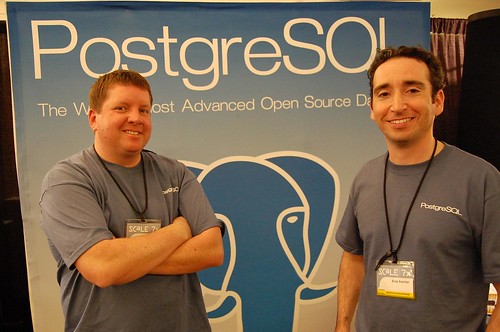
There’s going to be a new conference in Portland next July.
We’re calling it Open Source Bridge.
Our goal is this:
Create a completely volunteer-run, community conference to connect developers working with open source.
Let me explain with a little background:
My first tech conference was LISA in San Diego in 1997. I ran into Linus Torvalds in the hallway with my friend Steve, and we were both star-struck. I was still a student at the time, and loved every minute I spent rubbing elbows with people that were the pop-stars of the UNIXy world.
Since then, I attended LISA a few more times, OSCON, countless user group meetings for Perl, PostgreSQL. The last two years have been filled with local unconferences (BarCampPortland and WhereCampPDX to name just two) and travel to incredible community conferences like PgCon, LUG Radio Live, SCALE, Northwest Linux Fest, the Linux Plumbers Conference and last weekend’s Mentor Summit. And while on the board of the Legion of Tech, I’ve met and connected with more people than I ever thought I could know in Portland.
I love conferences. And I love Portland. Maybe you can guess what’s coming next.
During an intense brainstorming session at Side Project To Startup, a group of concerned Portlanders drew together a plan for a new conference. We packed a tiny room, and had a heated discussion about what we wanted, what Portland needed, and how we might do it. By the end of the session, Audrey Eschright and I agreed to co-chair. And with the support of Portland’s incredible tech community, we knew we could make it happen.
We called a few people, and I invited everyone over to talk about what to do next. We were: Audrey, Reid Beels, Professor Bart Massey, Rick Turoczy, Jake Kuramoto, Dawn Foster, Kelly Guimont, Adam Duvander.
We looked at the giant pieces of paper we’d scribbled notes on a few weeks before, and ate dinner together on a warm fall evening. And we decided to have a Town Hall.

Since then, we’ve been joined by Ward Cunningham (AboutUs), Irene Schwarting (Companies By Design), Harvey Mathews (SAO) and Clay Neal (City of Portland).
But enough with the history lesson!
Open Source Bridge will bring together the diverse tech communities of the greater Portland area and showcase our unique and thriving open source environment.
Open Source Bridge will have curated, discussion-focused conference sessions, mini-conferences for critical topics and will include unconference sessions.
We will show how well Portland does open source and share our best practices for development, community and connectedness with the rest of the world.
Lots of ideas are buzzing around in our heads, and we’d love to talk about them with you! If you’d like to contribute to the effort, stop by the town hall event October 30, 2008 at Cubespace. We’ll have another meeting November 6th, and it will be announced on Calagator.
At the town hall, you’ll have a chance to meet the members of the core organizing committee, and pick up a responsibility or two. We’ll be breaking off into teams for each of the major areas requiring organization, and distributing the work across many people. We will create a mailing list after this first meeting for those who just want to hear about what we’re up to, or participate in some other way.
Thanks for your interest, and we hope to see you tomorrow night!








